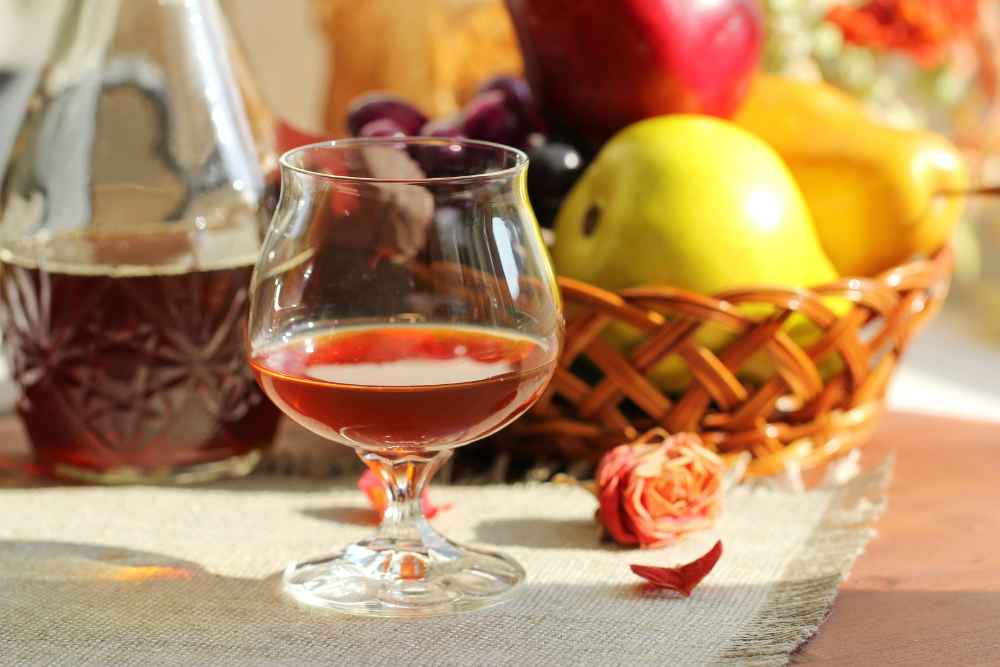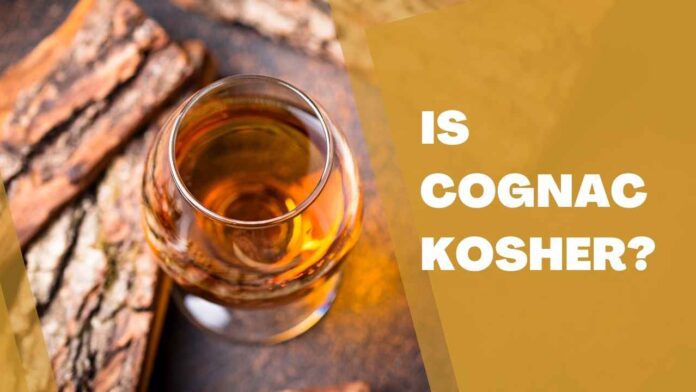This page may contain affiliate links. Please see our Disclaimer for more information. Always drink responsibly and adhere to your local legal drinking age.
Introduction
When it comes to enjoying a fine glass of cognac, many wonders: is this luxurious beverage kosher? The question has been debated for years, leaving cocktail enthusiasts searching for definitive answers.
In this blog post, we’ll dive into the world of cognac and explore Jewish dietary laws to determine its kosher status once and for all.
Key Takeaways:
- Reliable kosher certification, such as the OU/OU-P logo, is crucial to determining whether a particular cognac is considered kosher.
- Some debate exists among religious authorities and connoisseurs regarding wine-based cognac’s kosher status, but certified options are available on the market for observant Jews.
- Adding non-kosher flavors and sweeteners may impact a cognac’s overall kosher status, making it essential to seek out brands with trusted hechsher symbols before purchasing.
- Kosher-certified cognacs like Deau Cognac XO OK Kosher version, Courvoisier XO Cognac, Louis Royer, Hardy Cognacs, and Meukow are reputable options seeking to enjoy cocktails or after-dinner drinks without violating religious restrictions during Passover or any other occasion.
Understanding Cognac And Kosher Laws
Cognac is a type of brandy made from grapes, and to determine its kosher status, it’s essential to understand the process of cognac production and the laws surrounding kosher food and drink.
Definition Of Cognac
Cognac, a luxurious and sophisticated spirit, is a specific brandy from southwest France’s Cognac region. Distilled from wine made with Ugni Blanc grapes, cognac must follow strict regulations set forth by the Appellation d’Origine Contrôlée (AOC) to earn its prestigious name.
The aging process contributes to this sought-after beverage’s rich flavors and smoothness. As cognac matures over time, it develops a complexity of aromas revealing notes such as fruit, spice, nuts, and chocolate – ultimately delivering an exquisite sensory experience for cocktail drinkers who appreciate refined tastes.
For instance, fans may savor nuances like vanilla or caramel undertones in premier offerings like Courvoisier XO or Louis Royer’s elegant line of spirits.
The Production And Ingredients Of Cognac
Cognac is a type of brandy that must be produced in the Cognac region of France using specific grapes and production methods. The base ingredient for cognac is wine, typically made from Ugni Blanc grapes.
After the wine has been distilled twice, it is aged in oak barrels for at least two years before being bottled. The aging process is crucial to developing cognac’s complex flavors and aromas.
Some brands may age their cognacs for extended periods to achieve even more depth and complexity.
What Does It Mean For Food Or Drink To Be Considered “Kosher”?
For food or drink to be considered “kosher,” it must adhere to Jewish dietary laws. As the Torah outlines, these laws dictate which foods are acceptable and how they should be prepared.
Kosher certification is granted by a rabbi or trusted organization after a thorough inspection of ingredients, production methods, and facilities. For example, grape juice concentrate may need to come from an approved source for Passover consumption.
Regarding alcoholic beverages like cognac, there are additional considerations beyond just the base ingredient’s kosher status (grape). The process must comply with Jewish dietary laws, from distilling wine to aging.
Some brands may add flavors or use non-kosher wines during blending, which would disqualify them from being certified as kosher.
The Debate Over Cognac’s Kosher Status

Different perspectives on cognac’s kosher status exist, with some arguing that it is inherently kosher due to its grape-based production process. In contrast, others point out concerns about added flavors and non-kosher wine used in specific brands.
Different Perspectives On Cognac’s Kosher Status
Kosher certification for cognac is a topic of debate among religious authorities and connoisseurs alike. While some argue that all cognacs are kosher by default, others believe only those with proper hechsher should be consumed. Here are some different perspectives on the kosher status of cognac:
- Some argue that since all ingredients used in making cognac (grapes, yeast, water) are inherently kosher, it does not need certification.
- Others point out that flavorings and colorings can sometimes be added to cognac after distillation, which may contain non-kosher ingredients or be processed on non-kosher equipment.
- Certain cognac brands have been approved by prominent kosher certifying agencies like the Orthodox Union (OU), indicating that they meet strict standards of kashrut.
- However, even among those who agree that certain cognacs are kosher, there is disagreement over whether wine-based varieties can retain their kosher status once distilled into brandy.
- Some argue that wine-based brandies can become non-kosher when aged in casks that previously held non-kosher wines or spirits. In contrast, others maintain that the distillation process removes non-kosher elements.
Ultimately, whether or not to consume kosher-certified cognac is a personal decision informed by individual values and beliefs. However, it’s good to know that options are available for those who observe Jewish dietary laws and seek out kosher products.
The Position Of Major Kosher Certification Agencies
Major kosher certification agencies have varying positions on the kosher status of cognac. However, most agree that only certain cognacs and brandies are considered kosher due to their production process.
The main concern is the addition of flavors or sweeteners that may contain non-kosher ingredients. For instance, white grape juice concentrate commonly used for coloring in some cognacs may not be kosher-certified.
Therefore, checking for reliable hechsher symbols such as OU/OU-P is crucial before purchasing any cognac or brandy product.
The Debate Over Wine-Based Cognac
The debate over the kosher status of wine-based cognac has been discussed among many cocktail enthusiasts. Some argue that wine-based cognacs cannot be considered kosher, while others believe they can be certified.
Major kosher certification agencies have different positions on this matter, with some approving certain wine-based cognacs while others do not. However, several kosher-certified options exist for those who want to enjoy cognac without violating religious restrictions.
For example, Deau Cognac XO has an OK Kosher version with a unique story behind its certification process.
Is Cognac Kosher?
Reliable kosher certification is crucial in determining whether a particular cognac is considered kosher, with the OU/OU-P logo being a good indicator of accreditation.
The Importance Of Reliable Kosher Certification
Having reliable kosher certification is crucial for anyone who observes Jewish dietary laws. Kosher certification ensures the product complies with strict food and drink regulations, making it ideal for Passover or any other occasion.
For example, Louis Royer and Courvoisier XO Cognac are among those that have been certified as kosher by recognized agencies such as the Orthodox Union (OU). These brands bear the OU/OU-P logo on their bottles, empowering them to be suitable for Jewish consumption.
It’s important to note that a product may have been approved but does not currently carry valid certification, so always check before consuming.
The OU/OU-P Logo
If you’re hunting for a kosher cognac, watch for the OU/OU-P logo on the label. This logo indicates that the product has been certified kosher by the Orthodox Union, one of the most widely recognized certification agencies.
It’s important to note that just because a cognac doesn’t have this symbol doesn’t necessarily mean it isn’t kosher – some may have been approved in the past but no longer carry certification.
Always check with your rabbi or another trusted authority before consuming food or drink.
Kosher Certification For Passover
During Passover, there are additional restrictions on what can be considered kosher. While the base ingredient of cognac, grape, is kosher for Passover, added flavors may not be.
Therefore, looking for certified kosher cognacs approved specifically for Passover consumption is essential. The OU/OU-P logo is a reliable symbol to ensure the product meets all requirements and regulations.
One example of a kosher-certified cognac with an exciting story behind its certification is Deau Cognac XO OK Kosher version.
List Of Kosher Certified Cognac Brands

If you’re looking for kosher-certified cognac brands, here are some options to consider:
- Deau Cognac XO – The OK Kosher version of this cognac has a unique story as it is aged in barrels made from Israeli oak.
- Courvoisier XO Cognac – This high-end cognac has been certified kosher by the Union of Orthodox Jewish Congregations of America (OU).
- Louis Royer – The OU has also approved this classic VS Cognac as kosher.
- Hardy Cognacs – This brand offers a range of kosher-certified cognacs, including their VS, VSOP, and XO blends.
- Meukow – This French distillery produces a range of brandies that have received kosher certification.
It’s important to note that other kosher-certified cognacs may not be included in this list. Always look for reliable kosher certification symbols before purchasing any alcoholic beverage.
Drinking Non-Kosher Cognac
Consuming non-kosher cognac goes against Jewish dietary laws. It is essential to understand the restrictions on benefiting from non-kosher food; read on to learn more about the importance of reliable kosher certification.
The Restrictions On Consuming Non-Kosher Products
As per Jewish dietary laws, it is forbidden to consume non-kosher products. This includes any food or drink that does not comply with the regulations set by religious authorities.
Drinking non-kosher cognac may be problematic for those who follow these restrictions as it is considered a form of benefitting from non-kosher food. It’s important to note that even if a cognac brand was previously approved for kosher certification, its status may have changed due to changes in production or ingredients.
As such, it is crucial to always look for reliable kosher certification before indulging in any alcoholic beverage.
The Meaning Of “Benefitting” From Non-Kosher Food
It’s not just about consuming non-kosher food – there are restrictions on “benefitting” from it. This means that even if a non-kosher cognac is in your home or bar, you can’t use it to make a drink for someone who follows Jewish dietary laws.
Many cocktail drinkers only purchase kosher-certified Cognacs and brandies to avoid these issues.
Remember, choosing carefully is key to enjoying high-quality spirits while following religious restrictions.
FAQ
1. What makes cognac kosher or non-kosher?
For cognac to be considered kosher, the production and storage process must adhere to Jewish dietary laws, including restrictions on ingredients such as grapes, yeast, animal byproducts, and specific processing techniques. Non-kosher practices can make a cognac unsuitable for consumption during some religious events and ceremonies.
2. How can I tell if a bottle of cognac is certified kosher?
Certified kosher cognacs should display a reliable hechsher (kosher certification symbol) on their label, which indicates that they have been verified by an authorized agency or rabbi who has strictly supervised their production according to Jewish dietary laws.
3. Can all types of alcohol be made into kosher cognac?
Kosher guidelines prohibit using any fermented beverage derived from grains or fruits forbidden by Jewish law, such as wheat, oats, rye, or grapes grown in Israel, without proper supervision procedures in place. At the same time, other alternatives like potatoes are permitted since it doesn’t come under these restrictions.
4. Why might someone choose to consume only Kosher Cognac?
Some people follow strict adherence to Judaism’s dietary guidelines for religious purposes, while others prefer consuming vegan-friendly products that don’t contain any animal products
and chooses Kosher Cognacs due to assurance that it is produced using safe & ethical methods following strict supervisory standards.”
Conclusion: The Final Verdict On Cognac And Kosher Certification
In conclusion, whether or not cognac is kosher can be complicated. The production process and added flavors may impact its status. However, with reliable kosher certification like the OU/OU-P logo, consumers can enjoy a variety of kosher cognacs and brandies without concerns.
Adherence to Jewish dietary laws is essential when consuming alcoholic beverages and choosing products with the proper hechsher symbol.



















